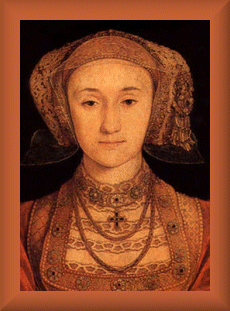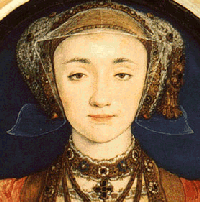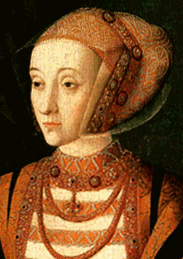ANNA of CLEVES

BORN: 1515 w MARRIED: JANUARY 6 1540 w DIVORCED: JULY 1540
DIED: JULY 16 1557
Anna of Cleves was Henry's only political marital alliance, which was probably to her ultimate benefit. Unlike his previous wives, hers was not a love match, but an arranged marriage made strictly for political reasons, to strengthen England's bond, as a newly Protestant country, with the Lutheran faction among the Germanic states.
Henry had remained in mourning for two years after the death of Jane Seymour, but the pressure upon him to secure the succession to the throne had only been eased with the birth of Prince Edward, not alleviated. Infant and child mortality rates during the sixteenth century were incredibly high, and it was typical for families to raise only a few of many children. In Henry's own family, this had only been too clearly demonstrated. Originally, Henry had six siblings. Only two of them survived to adulthood. In his own marriages, Catharine of Aragon had delivered two stillborn infants, and two who died within a short time after thier births. There was no reason to believe that Edward would survive into adulthood, particularly with the Tudors' poor track record for infant and child mortality.
Additionally, England was now isolated spiritually and to some degree politically from Catholic Europe. As Henry had been excommunicated from the Roman Catholic Church, so had England been as a nation. Protestantism was a fledgling movement, and was only firmly entrenched in the Germanic states. Additionally, France and the Holy Roman Empire had formed an alliance, after years of political and military wrangling, and announced that they were going to move against other European countries that had left Papal authority. Henry needed allies, and being excommunicate, could not count on any Catholic monarch to support him or for any Catholic noblewoman to marry him. So he looked to the Lutheran princes of the German states for both political and marital alliance. Thomas Cromwell, his pro-Protestant Chancellor, also supported a match with a Lutheran princess.
Henry's agents in a number of Lutheran courts sent him reports on various women, among them Christina, Duchess of Milan. It was she who responded, when approached with the notion of marrying Henry, whose checkered marital career had been the scandal of Europe, "had I two heads, one I would gladly leave to the King of England's disposal". Henry then realized that his break with Rome was not the only impediment to future marriages. He'd had three wives -- one set aside and neglected shamefully until her death, one executed by beheading, and one sacrificed in childbirth.
As the Renaissance had spread across Europe and as learning began to be embraced in the Lutheran countries (one of the hallmarks of Protestantism was its emphasis on reading and interpreting the Scriptures for oneself rather than allowing a priest to interpret for you), the position of noblewomen had changed slightly. They were being educated, and their male relatives no longer thought of them simply as chattel to be traded on the marriage market. In some cases, the woman's opinion had begun to matter so far as marriage arrangements were concerned. And it was a callous father or brother who would marry his daughter or sister to an aging king in a politically disadvantaged country who had a record of three wives who had been disposed of through various machinations.
The Duchy of Cleves was a small principality on the Rhine, which was far from fashionable or au courant with the popular gossip of the larger European courts. The Duke of Cleves had two unmarried sisters of "mature years", Amelia and Anne. Reports came back to Henry of the great beauty of the sisters, with Anne being praised by his envoy as "outshining her fair sister as the Sun outshines the Moon". As Amelia was accorded to be a great beauty, this exaggerated description made Anne sound exquisite. Henry's interest was piques, and one of the Tudor court painters, Hans Holbein was dispatched to make portraits of the two sisters, so that Henry could choose which one to make his fourth bride.
![]()
The portrait that Holbein made of Anne (above) is a bit of a cypher. Anne was painted wearing a traditional Cleves headdress and gown, both of which would have been considered wildly exotic and almost barbaric in England. Though the shape of Anne's nose is rather unusual, its size was balanced by the wings of her headdress and the strength of the rest of her face. It is also diminished by her being positioned facing the viewer, rather than from the side or a three quarter view, as was usual (see the portraits of Henry's other wives). Her complexion appears to be smooth, and it was the custom of the time for portrait painters to not include pockmarks. Add to this that Holbein placed the miniature portrait in a wooden frame carved in the form of a rose -- and Henry was smitten with the notion of an exotic and mysterious bride, who would also bring him considerable political clout.
Anna began her journey to England, which would involve a long overland trip on horseback, followed by crossing the English Channel. Around the same time, the brief accord between France and the Holy Roman Empire collapsed, and it was no longer necessary for Henry to become allied with Cleves. But Henry was determined to proceed with the match, enamoured of the romantic portrait of Anna.
After a terrible Channel crossing in stormy weather, Anna finally arrived in England. Henry, indulging his fondness for travelling incognito, arranged to have a surprise meeting with her, "to nourish love". While she was still recovering from her sea journey prior to travelling to London, he rode to her quarters and entered unannounced, dressed as a common traveller.
Anna had no idea who he was. She was terrified when the tall, fat, roughly dressed old man burst in upon her and her ladies, thinking they were about to be robbed or abducted. When he revealed himself to be King Henry, she nearly fainted.
Anna had been terribly seasick while crossing the Channel and was also debilitated from travelling overland from Cleves in winter weather. By her own later description, she "more resembled a half-drowned fish or mermaid" than a young woman. Henry found that she was taller than most women, large boned, and had a large, long nose. Her skin was naturally sallow, and she was even paler because of her illness and her fear of him -- and she had been marked by smallpox.
Worst of all, she did not speak a word of English -- or French, or Latin, both of which Henry spoke fluently. They finally managed to communicate fumblingly through one of her servants, who spoke a little English, and Anna unwittingly insulted Henry by stating that she had thought that he was a groom at first. Henry, his romantic illusions shattered, left abruptly, and returned to London, where his displeasure over his bride was soon broadcast by his own roars of anger.
He shouted, "I like her not! You have foisted a great Flanders mare upon me!" He referred to her as "a pockmarked Maypole" and repeatedly asked "need I put my head into this noose?" Frantically, he searched for a way out of the arrangement, and grasped at one straw -- an earlier betrothal of Anna to the son of the Duke of Lorraine. But documents were produced proving that the betrothal had been properly and legally broken, and that there was no impediment to Anna's marriage to Henry. To send her back to Cleves for no reason other than Henry's distate would permanently and dangerously alienate Henry's Lutheran alliances in Europe.
On January 6, 1540, Henry and Anna were married. The lavish celebrations that had been planned were rapidly scaled down at Henry's command. The wedding night heralded further disaster. It is not known what passed between Anna and Henry, but in the morning he exploded into further temper, stating that he had refused to consummate the marriage, and impugning her virtue by stating "by her breasts and belly one may know a maid -- I have felt her breasts and belly and I say that she is not a maid. I did not dare, for the sake of the Kingdom, go further!"
Henry's accusations off Anna's "unmaidenly" state were soon quashed, when one of her ladies asked her if she was still a virgin. She answered "I surely cannot be, because every night when the King comes to bed, he kisses me on the cheek and says 'Good-night, sweetheart'. Then he goes to sleep. In the morning, when he rises, he kisses me on the cheek again, and says 'Have a good day, sweetheart'. So you see, I cannot still be a virgin." When the complexities of sex in marriage were explained to her at length, she was amazed, and stated that nothing like that had passed between her and the King, or between her and any other man. This news was rapidly spread through the gossip mill, and Henry found that he was now a laughing stock.
![]()

a miniature of Anna of Cleves, after or possibly by Holbein
He took out his frustrations on Anna, trying repeatedly to anger and upset her. He sent away her ladies who had travelled with her from Cleves and ordered that she be attended by Englishwomen instead. Anna accepted this placidly. She made friends rapidly and enjoyed the lively company of the maids of honor who attended her.
He ordered that she put aside her traditional and cumbersome Germanic clothing and adopt more streamlined English styles. She liked this very much, and immediately ordered a large, lavish wardrobe that strained Henry's finances.
He commanded that she speak no language but English, and arranged for her to be tutored intensively. She learned the language with amazing speed, and was soon able to carry on a conversation with her increasingly confounded husband.
He knew that his cruel comments and remarks about her appearance must have reached her ears, but Anna never intimated that she had heard any of them, or showed any pain or anger over them.
Her life in Cleves had been concentrated on homemaking and domestic skills, and she was untutored in the artistic and musical pursuits so dear to Henry. He refused to make a middle ground or seek any pursuit that they could enjoy together.
Additionally, Anna's brother, the Duke of Cleves, was becoming hostile toward the Holy Roman Emperor, and Henry did not want England involved in a war. He continued to attempt to find a way to end this marriage he did not need or want, and avoided Anna whenever possible, leaving her to her own devices, while he followed his.
Henry's devices were very much occupied before his marriage to Anna was a month old, because one of her English maids of honour, Katherine Howard, had caught his eye.
Katherine Howard was a young, impoverished cousin of Anne Boleyn's, somewhere between the ages of sixteen and nineteen when she was placed as a maid of honour to Anna through the machinations of her uncle, Thomas Howard, the Duke of Norfolk. The Howards were a Catholic family, and the Duke wished to gain power at court, to tip the balance away from the Protestant Seymours. Katherine, in every way, was the antithesis of Anna -- she was young, petite, musical and strikingly beautiful. King Henry was once again enamoured of a woman, and he wished to make her his Queen.
Anna was approached by Thomas Cranmer, the Archbishop of Canterbury, and Thomas Cromwell. They were accompanied by armed guards, and she assumed incorrectly that they had come to take her to the Tower. Her royal husband's dislike of her had to be very apparent, and she fainted from terror, sure that her fate would be the same as that of Anne Boleyn. When she was revived, and told that they had come to tell her that her marriage to Henry was to be annulled, she shocked them by being delighted, and becoming very merry. After all, she had been the highest lady in the land, and was now being spurned by her royal husband!
When asked if she wanted to return to Cleves, Anna was adamant -- she liked England, and wished to stay there. She was more than ready to testify that her marriage had never been consummated, and that her previous betrothal to the son of the Duke of Lorraine had never been legally broken. She was more than willing to accept Henry's offer of several houses, a princely income, the honorary title of "the King's Beloved Sister". She also accepted the condition that having been the King's wife, she would not be permitted to remarry. She returned her wedding ring to him, requesting that he break it in half to symbolize that the bond between them as husband and wife was broken.
But Anna had some conditions of her own, before she would consent to the annullment. She wished to have access to the Royal children. She loved children, and had formed strong attachments to all three of them, particularly Elizabeth. As she could never remarry, Henry was effectively denying her the chance to have children of her own. Henry agreed, and as a tribute to her prudence and good sense, even allowed Prince Edward to visit her on occasion.
Anna happily retired to the various country homes that Henry had given her and occupied herself with refurbishing them and the domestic occupations that were her chief interest. She eventually converted to Catholicism, to her step-daughter, Mary's delight. She founded an orphans' school on one of her estates, and she was frequently at Court -- where she became one of her "brother", King Henry's favorite visitors! It seems they had much in common, particularly an interest in upgrading and modernizing their houses. They frequently exchanged cooks and household gadgetry.
Anna died peacefully in 1557, after Henry and Prince Edward had both died, and Mary had become Queen. Of all of Henry's wives, she was probably the most fortunate.
![]()

a portrait of Anna of Cleves, artist unknown
Anna's influence on England as a whole was probably not as profound as that of the women who were Henry's wives before her. She had no political aspirations and was not greatly learned. Her talents lay in the realm of relationships. She had no enemies, and many friends. She enjoyed the company of people, and was cherished by all who came into her sphere of influence.
Her personal influence was most important to the Royal children, who had up until that time, been raised largely in isolation by servants. Mary, of course, had fond memories of a loving mother, but Edward had never known his mother, and Elizabeth had only fleeting memories of hers. Anna became a very important person in all three of Henry's children's lives, but her contribution to the younger children was invaluable. She loved them effortlessly and unconditionally, giving them some of the affection and support that they had never had.
There has been great conjecture about Anna's actual appearance, as contemporary accounts vary widely. Henry described her as "monstrous", but he was determined that the match would be dissolved, and probably exaggerated in an attempt to make his repugnance for the marriage very clear. Others described her more kindly -- she was tall and large boned, but not objectionable to look at. Her pockmarks have been described as faint and few, lesser than many that marked ladies who were considered great beauties. Once she recovered from the seasickness that marred her appearance upon arriving in England, she was reported to be far from unattractive, though she did not fit the dimpled, petite and rosy complexioned standards of English beauty.
Portraits other than the famous Holbein miniature portray the same face -- strongly featured, with a large nose. It is difficult to trust accounts made of her appearance at the time, because they were often slanted to reflect the ambitions or wishes of those who made them, as in the case of Henry's envoy describing her as a great beauty. For instance, when she arrived in England, at her first public appearance, she had a black veil over her hair. People who saw her from a distance assumed that her hair was black, and she gained the nickname "blackamoor" as a result. Anna's hair was actually light brown and curly!
Anna never resented Katherine Howard, but was very fond of her, both as her maid of honour and then when she became Henry's fifth Queen. She was genuinely distressed by Katherine's fall from grace and execution. She had less use for Katherine Parr, Henry's sixth wife, whom she considered far less attractive than herself!